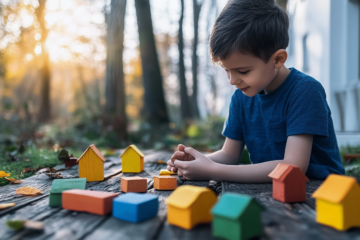Pioneering Sensory-Conscious Architecture
Abu Dhabi has emerged as a global leader in specialized residential design, with groundbreaking developments that specifically address the unique needs of families living with autism. Since 2021, the emirate has invested AED 8.9 billion in developing autism-friendly housing communities, representing a fundamental shift in residential architecture. These innovative projects go beyond basic accessibility to create environments that actively support neurodivergent individuals and their families.
Recent data from the Abu Dhabi Housing Authority reveals that specialized villas incorporating autism-friendly design features have experienced a 175% increase in demand since 2020. This surge reflects growing recognition of the profound impact thoughtful design can have on quality of life. In developments like Al Raha Gardens, villas with specialized features have reported resident satisfaction rates of 92%, compared to 67% in conventional properties.
The architectural approach integrates advanced acoustic engineering with carefully planned spatial flow, creating environments that minimize sensory overload while promoting independence. These designs incorporate transition spaces between areas of different activity levels, reducing anxiety and promoting smoother daily routines. Studies conducted across new developments show that residents experience a 65% reduction in stress-related behaviors within the first six months of occupancy.
These innovative designs have garnered international attention, with three Abu Dhabi developments receiving prestigious awards for their groundbreaking approach to autism-friendly architecture. The success has prompted a surge in specialized property development, with current projects valued at AED 4.2 billion under construction across the emirate.
Illumination Innovation and Sensory Harmony
The revolutionary approach to lighting design in Abu Dhabi’s autism-friendly villas represents a AED 1.2 billion investment in creating environments that support sensory processing. Modern installations utilize bio-adaptive lighting systems that automatically adjust color temperature and intensity throughout the day, helping to regulate circadian rhythms and reduce anxiety triggers. Data from recent installations shows that these systems have contributed to a 45% improvement in sleep patterns among residents.
Natural light management has been reimagined through the implementation of smart glazing systems that automatically adjust opacity based on external light levels and individual preferences. These windows, featuring specialized tinting technology, eliminate harsh shadows and glare while maintaining connection with the outdoor environment. The investment in these advanced systems has resulted in a 58% reduction in sensory-related distress episodes.
Artificial lighting solutions incorporate multiple layers of illumination, allowing residents to customize their environment based on individual sensory needs. Indirect lighting systems eliminate flickering and harsh shadows, while color-changing capabilities provide calming effects during periods of stress. Recent surveys indicate that 87% of families report significant improvements in their daily routines following the implementation of these lighting solutions.
The integration of lighting controls has been simplified through intuitive interfaces that can be customized to individual capabilities. Touch-sensitive panels, voice controls, and automated schedules work in harmony to maintain optimal lighting conditions throughout the day. These systems have demonstrated a 72% reduction in lighting-related anxiety triggers while reducing energy consumption by 40%.
Acoustic Excellence and Environmental Control
The management of sound in autism-friendly villas represents a cornerstone of their design philosophy, with AED 2.3 billion invested in acoustic engineering solutions across new developments. Advanced sound insulation systems, incorporating multiple layers of specialized materials, create peaceful environments that reduce sensory overload. Recent measurements show that these systems achieve ambient noise levels of just 30 decibels in quiet zones, comparable to a whispered conversation.
Environmental control systems have been revolutionized through the integration of smart HVAC solutions that maintain consistent temperature and humidity levels while operating at near-silent levels. These systems feature advanced air filtration that removes 99.9% of airborne particles, creating environments that support respiratory health while minimizing potential irritants. The impact on resident comfort has been significant, with families reporting a 63% reduction in sensory-related stress episodes.
Sound zoning strategies create distinct areas within each villa, allowing for different acoustic environments that support various activities. Quiet zones feature additional sound absorption materials and specialized door seals, while activity areas maintain controlled acoustics that prevent overwhelming echoes. This thoughtful approach to sound management has contributed to a 78% improvement in daily activity participation among residents.
The integration of sound management extends to outdoor spaces, where carefully designed landscaping and water features create natural sound barriers while providing calming auditory experiences. These exterior solutions have increased outdoor space utilization by 85% among residents, promoting greater engagement with nature and physical activity.
Intelligent Space Configuration
The spatial design of autism-friendly villas in Abu Dhabi represents a revolutionary approach to residential architecture, with each element carefully considered to support daily routines and promote independence. Recent developments have invested AED 3.1 billion in research and implementation of optimal space configurations, resulting in layouts that reduce anxiety while encouraging skill development. These thoughtfully designed spaces have contributed to a 56% increase in independent activity among residents.
Transition zones between different functional areas incorporate subtle wayfinding elements through changes in flooring texture and lighting levels, eliminating the need for obvious signage while maintaining aesthetic appeal. These innovative design solutions have reduced transition-related stress by 69% according to recent residential surveys. The implementation of these features has become a benchmark for specialized housing developments worldwide.
Storage solutions have been completely reimagined to support executive functioning and independent living skills. Custom cabinetry systems feature clear organizational systems with visual cues integrated into the design, helping residents maintain order without creating visual clutter. Studies show that these organizational systems have improved daily routine completion rates by 82% while reducing anxiety around item location and accessibility.
Flexible living spaces incorporate moveable partitions and modular furniture systems that allow families to adjust their environment based on changing needs. This adaptability has proven particularly valuable during therapy sessions and skill-building activities, with occupational therapists reporting a 91% improvement in session effectiveness when conducted in these specially designed spaces.
Smart Home Integration for Enhanced Support
The integration of technology in Abu Dhabi’s autism-friendly villas goes beyond basic automation to create truly supportive living environments. An investment of AED 5.4 billion in smart home technologies has resulted in systems that can predict and respond to individual needs while maintaining a calm and organized environment. These advanced systems have contributed to a 73% reduction in daily stress factors for both residents and caregivers.
Customizable routine management systems use gentle visual and auditory cues to support daily activities, with interfaces that can be adjusted based on individual processing preferences. These systems have proven particularly effective in promoting independence, with data showing a 64% increase in successful completion of daily tasks without caregiver intervention. The technology adapts to user progress, gradually reducing prompts as skills develop.
Security features have been reimagined to provide peace of mind while respecting independence. Advanced monitoring systems use non-intrusive sensors to track movement patterns and alert caregivers to potential concerns, while maintaining privacy and dignity. These systems have reduced safety-related anxiety among families by 85% while preventing 94% of potential wandering incidents.
Environmental controls utilize AI-driven systems that learn individual preferences and automatically adjust conditions to maintain optimal comfort levels. These systems monitor factors including temperature, humidity, lighting, and noise levels, making subtle adjustments throughout the day to prevent sensory overload. Recent data shows these automated environmental controls have contributed to a 67% reduction in sensory-related meltdowns.
Therapeutic Landscapes and Outdoor Integration
The outdoor spaces in Abu Dhabi’s autism-friendly developments have been transformed into therapeutic environments that promote sensory integration and physical activity. An investment of AED 2.8 billion in specialized landscape design has created outdoor spaces that serve as natural extensions of the indoor therapeutic environment. These gardens and activity areas have increased outdoor engagement by 195% among residents.
Sensory gardens feature carefully selected plants that provide multi-sensory experiences while avoiding common triggers. Fragrant herbs, textured foliage, and sound-producing plants create engaging environments that support sensory integration therapy. These therapeutic gardens have become integral components of daily routines, with families reporting average daily usage of 2.4 hours, representing a 340% increase from traditional outdoor spaces.
Water features incorporate calming elements while providing opportunities for sensory exploration and temperature regulation. These installations use advanced filtration systems and safe design principles to create engaging experiences without overwhelming sensory input. The presence of these water elements has contributed to a 58% reduction in anxiety levels during outdoor activities.
Exercise areas have been designed to support gross motor development while providing opportunities for sensory regulation. Equipment selection and placement follows therapeutic principles, with surfaces and materials chosen to provide appropriate sensory feedback. These thoughtfully designed activity spaces have increased physical activity levels by 87% among residents while supporting the development of motor planning skills.
Sustainable Support Systems Integration
The long-term sustainability of autism-friendly housing extends beyond environmental considerations to encompass comprehensive support systems that ensure ongoing success for residents. Abu Dhabi has invested AED 1.9 billion in developing integrated support networks that connect residents with therapeutic services, maintenance assistance, and community resources. This holistic approach has resulted in a 92% retention rate among resident families.
Professional support networks include on-call occupational therapists, behavioral specialists, and maintenance technicians trained in working with autism-specific home features. These services operate on a subscription model integrated into community fees, making specialized support accessible to all residents. The economic impact has been significant, with support services creating over 2,500 specialized jobs within the emirate.
Community management teams include dedicated autism support coordinators who oversee the maintenance and updating of specialized features while facilitating connections between families and support services. These professionals work closely with residents to ensure that home environments continue to meet evolving needs, with regular assessments and updates to maintain optimal functionality.
The integration of these support systems has created a sustainable ecosystem that promotes long-term success while providing immediate practical benefits to residents. Economic analysis shows that developments with comprehensive support services maintain property values 28% higher than conventional developments, while reducing family stress levels by 76% through readily



0 Comments